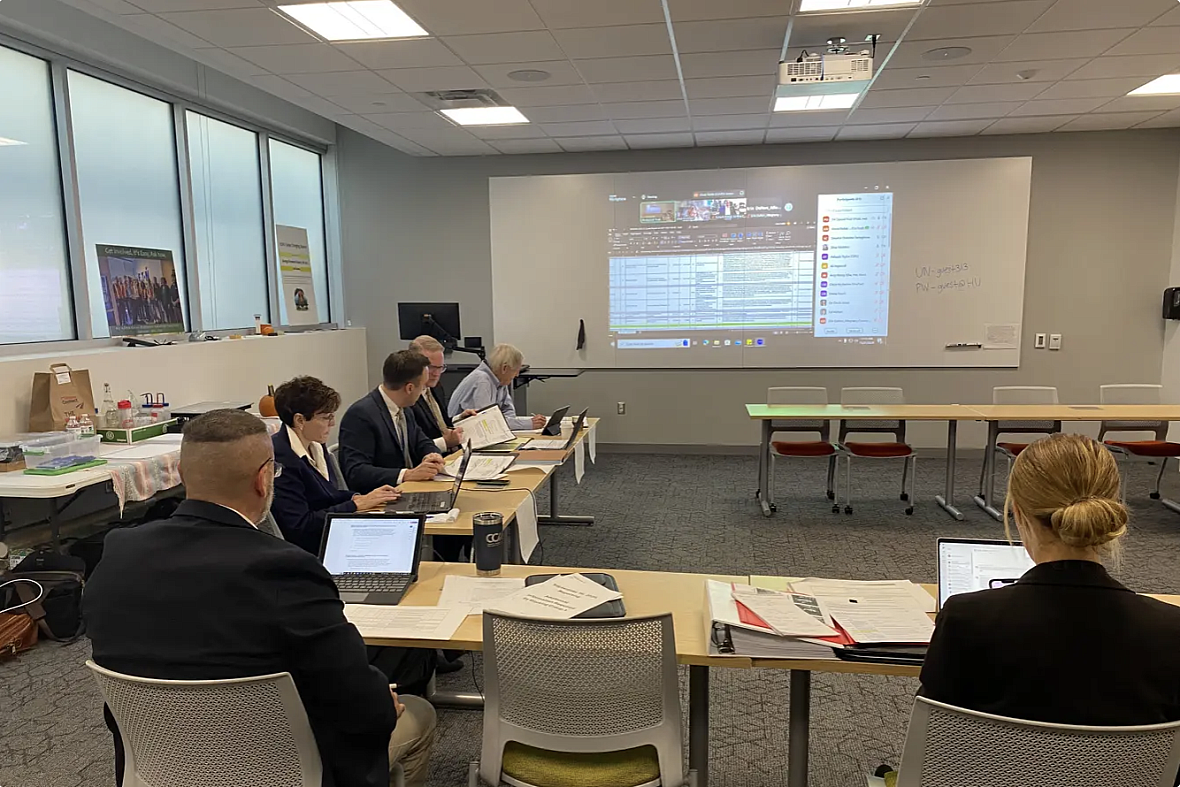Counties fight for more freedom over how to spend opioid money with $247M more on the way
The story was originally published by the Spotlight PA with support from our 2024 Data Fellowship.

The Pennsylvania Opioid Misuse and Addiction Abatement Trust has the power to withhold opioid settlement money if it decides local governments spent the money inappropriately.
Ed Mahon / Spotlight PA
HARRISBURG — As local governments prepare to receive roughly $247 million more to fight the opioid epidemic, some Pennsylvania counties are fighting decisions made by a state oversight board to reject their spending plans.
The Pennsylvania Opioid Misuse and Addiction Abatement Trust board has great power to oversee the spending of potentially billions in opioid settlement money paid by companies to settle claims over their role in the opioid crisis.
The board has been criticized for rejecting a youth program in Somerset County and initiatives to support residents of Philadelphia’s Kensington neighborhood. The members’ use of private meetings to discuss what spending is allowed has also drawn criticism.
Philadelphia, for example, has alleged in a complaint that board members secretly expressed a preference for “‘just-say-no’ type strategies” when considering whether to reject the city’s plans.
The board on Nov. 21 approved distributing the next round of opioid settlement funds, which now include money from multiple new companies. The state’s distribution plan calls for the payments to go out around mid-December.
Counties and other local governments received their first opioid settlement payments in 2022, and they are supposed to spend the money in ways that align with a settlement document called Exhibit E, which describes approved and recommended strategies. The list includes medication to reverse opioid overdoses, treatment for people in jail or prison, programs that provide clean syringes to drug users, prevention programs, and opioid-related treatment.
If counties spend the money inappropriately, the trust has the power to cut future funding.
But there have been disagreements over what type of spending is appropriate, and how much discretion local governments have. A community leader in Kensington called the board’s June rejection of programs “a retraumatizing moment.”
Somerset County in southwestern Pennsylvania and Philadelphia recently appealed in Commonwealth Court decisions by the trust to reject their spending choices. Trust officials declined to comment on the appeals beyond what is said in the court filings.
A successful appeal would have a “huge impact” and could bring “some uniformity and maybe some relief for other counties,” Jaclyn Shaw, an attorney for Somerset County, told Spotlight PA.
Somerset County is challenging the trust’s decision to reject $30,000 for a youth program that the appeal describes as providing weekly opportunities for outdoor activities and mentorship. In their appeal filed in October, attorneys for Somerset County said the program is “evidence-informed” and complies with Exhibit E. They also want the trust to be forced to create standard operating procedures that allow beneficiaries to seek preapproval of their anticipated spending.
In response, attorneys for the opioid trust maintained the program isn’t compliant, argued the opioid board isn’t authorized to create a “pre-approval” process, and urged the court to deny the appeal.
Philadelphia’s appeal involves more money. It is challenging the trust’s decisions to reject millions of dollars for programs aimed at supporting residents of the Kensington area, which the city calls “the epicenter of the opioid crisis.” One contested initiative provides home repairs with the stated goal of preventing homelessness and promoting housing stability. Another supports “small businesses to prevent vacant buildings and trash-strewn lots,” the city’s appeal said.
In Philadelphia’s appeal, filed Nov. 4, attorneys for the city argued the trust’s reading of Exhibit E is too narrow, and said the city’s money is being used for evidence-informed efforts that should be permitted.
The attorneys also asked for greater clarity from Commonwealth Court, and said the state’s opioid trust should “disapprove of spending only when it is clearly unrelated to” opioid use disorder, co-occurring substance use disorder or mental health issues, overdoses, or mitigating the effects of the opioid epidemic.
There has already been back and forth over the Kensington programs. The full board rejected $7.5 million worth of resident support programs in June, but a committee of the trust later reversed some of the rejections. Philly’s appeal describes $3.4 million in money it says was wrongly denied, although figures previously released by the trust describe a lower amount.
Counties had to file their first comprehensive spending reports with the opioid trust in March. A court order governing Pennsylvania’s opioid settlement money was recently amended to clarify that other local government agencies receiving funds based on their role in opioid litigation must also file these spending reports.
That change addresses an apparent ambiguity, which Spotlight PA and WESA first reported in May 2023, that allowed spending decisions by a number of district attorneys, cities, and other local governments to go unchecked.
Trust members voted on a new batch of spending reports on Nov. 21. They again rejected programs from Philadelphia, including one described as maintaining houses for people in North and West Philadelphia with experiences of addiction and recovery.
Despite those rejections, trust chair Tom VanKirk highlighted the large number of programs across the state that the trust approved.
“It isn’t because the trust is becoming more lenient or making bigger exceptions for Exhibit E,” he said. “I do think everybody has been learning from this process.”
Secret meetings criticized
Since the opioid trust formed in 2022, members of the board have frequently met in secret, blocked members of the public from speaking at their meetings, and released limited information about the trust’s spending.
The trust’s use of closed-door meetings — which Spotlight PA and WESA first publicly questioned last year and again in March — have been a point of contention during these spending disputes.
In an earlier complaint to a committee of the trust, Philadelphia criticized statements made by trust members during closed meetings.
“Indeed, in the meeting of the working group that was closed to the public and consisted of five members of the Board, Board members expressed a subjective preference for programs that target individuals or include ‘just-say-no’ type strategies,” Philadelphia’s complaint said. “The working group also impermissibly considered other factors such as Philadelphia’s other pending litigation and potential future opioid settlements.”
Separately, attorneys for Somerset County brought up the private meetings in their appeal to Commonwealth Court. The appeal said the county “does not agree that the meetings of the Working Groups should not be open to the public as they otherwise constitute deliberations of a facet of the Board which are otherwise subject to public view and comment.”
A court order that defines the role of the trust says its meetings and proceedings are subject to the Sunshine Act, a state law that imposes transparency requirements on a variety of agencies. The law’s definition of agency includes a body and “all committees thereof authorized by the body to take official action or render advice on matters of agency business.”
Trust officials have previously defended the use of private meetings, although those responses did not directly address the Sunshine Act requirements on committees that render advice. Following Spotlight PA and WESA reporting, one of the board’s own members questioned the legality of the private meetings.
While the trust’s actions have limited public involvement, Spotlight PA has taken multiple steps to give the public greater insight into opioid settlement spending decisions. Most recently, the newsroom created an interactive database to let members of the public track spending decisions and whether they were approved by the trust. The database covers roughly $70 million worth of spending decisions involving about 450 programs or responses. The figures include both funds that were reported as spent and planned spending.
Since launching the database, Spotlight PA has heard from people in various parts of the state who have flagged issues they have concerns or questions about, including why one county reported spending no money and why another appeared to spend funds on a program based in another county. Cathleen Palm, a Berks County resident who advocates for measures to protect children, publicly praised the transparency that the database brought to these issues.
“County-by-county you can peruse what the priorities are,” Palm posted online. “Even better type in infant or child or even soccer and you will see what comes up allowing even more clarity about what communities have said are the most pressing needs they want to spend these dollars on when it comes to children and families.”


